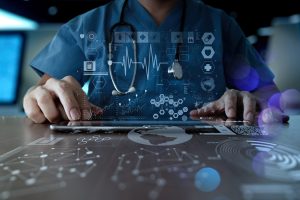Technology is ubiquitous in modern day life – smart phones, smart cars, smart homes and now smart health. It has revolutionized both the personal and professional world and the healthcare industry is no exception. Recent technological developments have changed the landscape of health research, practice and engagement and people are changing with it.
Better Software means Better Results
The process of medical diagnosis has been made better with the advent of AI-powered computing modules. Using machine-learning algorithms based on specific rules and logic, it’s possible for AI software to analyze complex medical data and provide diagnostic conclusions without human intervention.
Electronic medical records have significantly impacted the way information is stored, sorted and evaluated. Machine-learned intelligence is able to access these records and make health predictions based on those statistics. The availability of new ideas as a result of the accuracy and immediacy of this processed data means better medical predictions.
The potential is limitless: early detection of diseases based on anomalous data means fewer hospitalizations. More precise diagnoses mean better chances for successful treatment and improved quality of life. Analysis of the issues means quicker identification of trends which may positively inform policy and practice in the healthcare industry.
Smart-Tracking Devices and Telemedicine
The internet of medical things (IoMT) has changed the way patients and their providers can monitor biometric data in real-time and provide predictive alerts if something looks not-quite-right. For example, the Guardian Connect System is a tool designed to help people with diabetes and take insulin on a regular basis. It tracks glucose levels and sends notifications to a user’s smartphone if there is a concern. Doctors are also able to access this data so they can receive an updated snapshot of their patient’s health. With a more comprehensive picture of their patient’s health, they are able to suggest preventative measures for better quality of life or diagnose a medical condition.
Telemedicine has made distance a problem of the past for many people now that an internet connection means easier access to their healthcare provider. Videoconferencing technology (telemedicine) has made it possible for those in remote areas to connect with their medical team. Used in tandem with IoMT, people who previously had to travel long distances to get tests and make appointments can now enjoy a higher quality of health care from their own location.
The Future of Health Care Technology
The healthcare industry is responsible for managing some of the most sensitive personal information collected about an individual. As advances in technology continue, conversations about how best to safeguard the data is more important than ever. The legal and ethical implications for data management are complex and will require close examination of the issues. Despite the challenges, the benefits can outweigh the drawbacks for our health.























